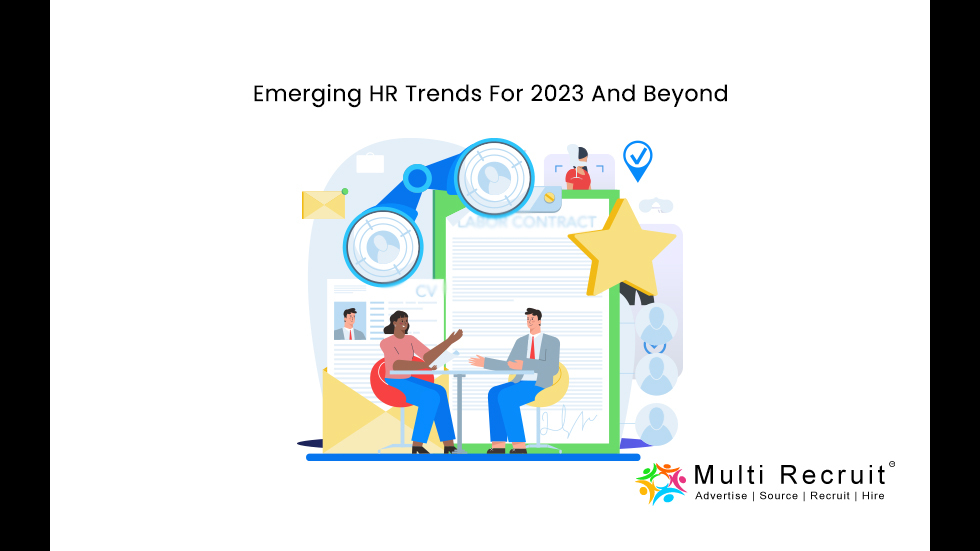The year 2022 may be stepping back into some semblance of normalcy, but it has remained challenging for HR and employees. The cost-of-living crisis, the impending recession, and the ongoing talent shortage have combined to shift priorities and create new opportunities.
There will be numerous changes in the world of employment in 2023. As a result of the epidemic, digital transformation has accelerated, and employee-employer relationships have shifted. In 2023, upcoming HR trends will add value to the recent transformation of the HR industry by bringing a more efficient hybrid work model to the metaverse.
As we move into the next year, HR has the opportunity to redefine the role it plays in the post-pandemic era. In the aftermath of the pandemic, the resulting inflation spike, and the subsequent economic recession, human resources specialists have been crucial to companies’ survival. As a result, HR can have a great impact on enterprises if it is properly enabled.
In this article, we’ve outlined HR trends we believe will influence the workplace in 2023. The development of some trends has been ongoing for some time, but recent events have accelerated them. In some circumstances, firms are currently dealing with the consequences of significant adjustments they have had to make.
For your convenience, we’ve compiled emerging HR trends and predictions based on recent data.
What are the different types of Emerging HR Trends For 2023 And Beyond?
The different types of Emerging HR Trends For 2023 And Beyond are:
1. The virtual workplace
The American workforce will be working fully remotely by 2028, according to future projections. Those who work for it want it. As a result, virtual working will continue to exist in some form. Although we’re fans at People Managing People, it isn’t without challenges.
There is no one-size-fits-all solution for how teams should work, according to Amazon CEO Andy Jassy. Consequently, Amazon allows teams to choose their best working style. There may even be some teams who choose to work in the metaverse—virtual reality-enabled workspaces.
Check out our article on how to adapt to hybrid models for help on adapting to these new styles of working.
2. Your job won’t be taken over by AI
Despite some truth to the narrative that robots are coming to replace us, it’s a common narrative. It’s anyone’s guess how it’s all going to turn out in the long run (we’re hoping for techno-utopia).
According to a new study, artificial intelligence is replacing middle managers, boosting product development, and protecting HR jobs.
Human resources professionals can use AI for data entry, recruitment, and people analytics.
3. Designing employee experiences
Employee experience is increasingly being improved by HR and People & Culture teams using design-led approaches.
Designing products and services that increase employee engagement, product, and retention means borrowing concepts from UX and CX teams.
4. Inclusion, diversity, and equity
By 2065, the US is predicted to have no dominant ethnic or racial group? The issue of diversity, equity, and inclusion will finally be addressed as populations diversify and more women and people from underrepresented groups join the workforce.
DEI projects will be funded more aggressively, DEI officers will be appointed, and employee resource groups, advisory boards, and task forces will be established.
5. The global workforce
The rise of a globally distributed workforce is also predicted with the advent of remote work. Previously, hiring someone from abroad was a bit scary and complicated, but as companies become accustomed to remote work, hiring someone from another time zone will become more common. Moreover, employer-of-record organizations are becoming more prevalent, easing HR’s burden.
6. The 101 of onboarding
The Sapling study found that 88% of organizations still struggle with onboarding.
Since everyone was forced to stay at home because of the pandemic, the onboarding process was already struggling. The challenges of remote hiring, onboarding, and training were even greater for HR professionals.
The importance of improving the onboarding process has never been greater. According to a BambooHR study, 89 percent of people who received effective onboarding felt deeply ingrained in their culture, while 59 percent felt ineffective onboarding.
Finally, according to the same study, employees who experienced a successful onboarding process were 113 times more likely to be satisfied with the HR department’s capability.
Conclusion
There is no way of knowing what the future holds, but we are pretty confident about the above. Would you like to add any trends we missed?
Subscribe to Multirecruit’s weekly newsletter for all our latest articles on the workplace and become part of our community of HR professionals, managers, and business leaders.

